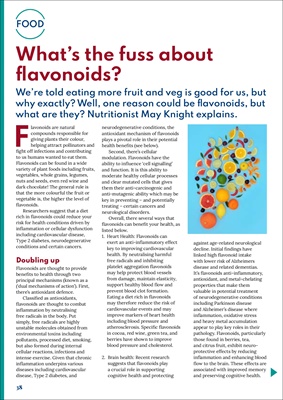
38
FOOD
What's the fuss about
flavonoids?
We're told eating more fruit and veg is good for us, but
why exactly? Well, one reason could be flavonoids, but
what are they? Nutritionist May Knight explains.
Flavonoids are natural
compounds responsible for
giving plants their colour,
helping attract pollinators and
fight off infections and contributing
to us humans wanted to eat them.
Flavonoids can be found in a wide
variety of plant foods including fruits,
vegetables, whole grains, legumes,
nuts and seeds, even red wine and
dark chocolate! The general rule is
that the more colourful the fruit or
vegetable is, the higher the level of
flavonoids.
Researchers suggest that a diet
rich in flavonoids could reduce your
risk for health conditions driven by
inflammation or cellular dysfunction
including cardiovascular disease,
Type 2 diabetes, neurodegenerative
conditions and certain cancers.
Doubling up
Flavonoids are thought to provide
benefits to health through two
principal mechanisms (known as a
('dual mechanisms of action'). First,
there's antioxidant defence.
Classified as antioxidants,
flavonoids are thought to combat
inflammation by neutralising
free radicals in the body. Put
simply, free radicals are highly
unstable molecules obtained from
environmental toxins including
pollutants, processed diet, smoking,
but also formed during internal
cellular reactions, infections and
intense exercise. Given that chronic
inflammation underpins various
diseases including cardiovascular
disease, Type 2 diabetes, and
neurodegenerative conditions, the
antioxidant mechanism of flavonoids
plays a pivotal role in their potential
health benefits (see below).
Second, there's cellular
modulation. Flavonoids have the
ability to influence 'cell signalling'
and function. It is this ability to
moderate healthy cellular processes
and clear mutated cells that gives
them their anti-carcinogenic and
anti-mutagenic ability which may be
key in preventing - and potentially
treating - certain cancers and
neurological disorders.
Overall, there several ways that
flavonoids can benefit your health, as
listed below.
1. Heart Health: Flavonoids can
exert an anti-inflammatory effect
key to improving cardiovascular
health. By neutralising harmful
free radicals and inhibiting
platelet aggregation flavonoids
may help protect blood vessels
from damage, maintain elasticity,
support healthy blood flow and
prevent blood clot formation.
Eating a diet rich in flavonoids
may therefore reduce the risk of
cardiovascular events and may
improve markers of heart health
including blood pressure and
atherosclerosis. Specific flavonoids
in cocoa, red wine, green tea, and
berries have shown to improve
blood pressure and cholesterol.
2. Brain health: Recent research
suggests that flavonoids play
a crucial role in supporting
cognitive health and protecting
against age-related neurological
decline. Initial findings have
linked high flavonoid intake
with lower risk of Alzheimers
disease and related dementias.
It's flavonoids anti-inflammatory,
antioxidant, and metal-chelating
properties that make them
valuable in potential treatment
of neurodegenerative conditions
including Parkinson disease
and Alzheimer's disease where
inflammation, oxidative stress
and heavy metal accumulation
appear to play key roles in their
pathology. Flavonoids, particularly
those found in berries, tea,
and citrus fruit, exhibit neuroprotective
effects by reducing
inflammation and enhancing blood
flow to the brain. These effects are
associated with improved memory
and preserving cognitive health.